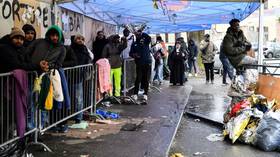Tesla owes thousands of customers in Norway $16,000 each in fines over reduced battery capacities
Tesla has been ordered to pay 136,000 kroner – approximately $16,000 – to thousands of its Norwegian customers, following complaints about reduced battery capacities and charging speeds.
Dozens of owners in Norway and elsewhere began complaining about big drops in mileage ranges following a 2019 software update.
Tesla said at the time that the update was to “protect the battery and improve battery longevity,” and that only a small percentage of customers would be affected. It appears only certain Model S and X customers with 2013-2015 models ended up seeing the drops.
Also on rt.com Musk says he supports crypto in battle against fiat moneyTesla reportedly failed to respond to the Norway lawsuit and a judgement was made in absentia, according to Norwegian outlet Nettavisen. The 30 customers on the suit will each receive payments of $16,000, but the affected models were sold approximately 10,000 times during the time period, according to data from Nettavisen, meaning future settlements could get much more expensive – though it remains unclear how many customers will actually receive payouts thanks to this new ruling.
If it does not appeal, Tesla has until May 31 to pay the current fines.
Tesla is also facing a class-action lawsuit in the US related to slower charging speeds in older models. The suit, filed in California, alleges fraud on the part of Elon Musk’s company and claims that Tesla’s software update was to “avoid” recalling or replacing batteries which it “knew were defective.”
“Under the guise of ‘safety’ and increasing the ‘longevity’ of the batteries of the Class Vehicles, Tesla fraudulently manipulated its software with the intent to avoid its duties and legal obligations to customers to fix, repair, or replace the batteries of the Class Vehicles,” that lawsuit reads, adding that it failed to inform its customers of the defects.
Like this story? Share it with a friend!















